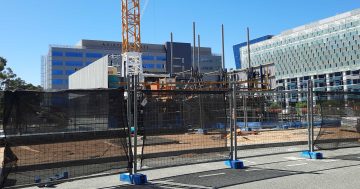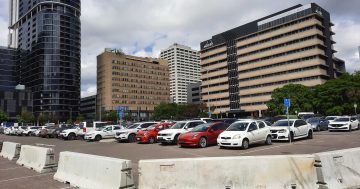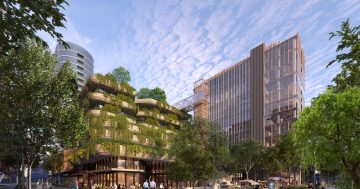
Seven and a half years and still standing: the abandoned Alexander building in Woden.
It looks like a set from World War Z. The only thing missing are the zombies, but they probably come out at night.
For seven and a half years now the Alexander and Albemarle offices in Woden have stood vacant, the site fenced off but subject to the ravages of time, vandals, and graffiti. They are pock marked with barely a window left unsmashed.
It is a towering edifice of urban decay literally only a stone’s throw from gleaming new offices and community facilities such as the ageing but busy library.
Obvious shelter for the homeless and a haven for criminal or other dubious activity, the site is so forbidding that even the police are loathed to enter and will only go in during a life-threatening situation.
But don’t expect Woden’s zombie apocalypse to be coming down and redeveloped anytime soon.
The owners, Doma Group, say the ACT’s taxes and charges regime makes the more than 1ha site financially unviable to demolish and redevelop.
It’s a case of we told you so to the Government. “Industry some years ago warned the Government that the proposed change from the change of use charge to the lease variation charge would have a detrimental effect on older building stock in the city and the town centres, rendering larger old building both physically and financially redundant,” Doma’s General Manager Development, Gavin Edgar, said.
He said the Government was encouraging development by adjusting the Territory Plan, but the key planning lever it controlled was the cost of development and that was in the hands of Treasury.
“The change to the system to the Lease Variation Charge (LVC) effectively doubles the tax on the development and renders it not feasible,” Mr Edgar said.
On top of this Icon Water announced it would charge an additional amount for any redevelopment to pay them to service the land.
“Logic would say that this should be discounted from the LVC payable, but the Territory has not acknowledged and instead maintains the fiction that the Icon charges are independent of development taxes and charges that it levies,” he said.
“More recently, the Territory unexpectedly announced even higher charges for redevelopment.”
Mr Edgar said a transitional period was introduced but the exemption only applied to properties purchased between 1 July 2016 and 30 June 2017, ”making it even less likely for older buildings to be redeveloped”.
The Government, however, is not budging, with a spokesman saying the ACT Government has no plans to change its position on the lease variation charge.
The spokesman said the site was on a privately leased site and the Government was committed to the revitalisation of the Town Centre through the revised Woden Town Centre Master Plan and public infrastructure in the area.
“The ACT Government will continue discussions about redevelopment opportunities with the Doma Group and other building owners in the Town Centre to realise the vision for a renewed and vibrant town centre,” the spokesperson said.
However, Mr Edgar said Woden would probably have to wait for light rail before the Government’s economic attention turned there.
“The focus of the Government has been on Government-owned greenfield and infill sites. Neither the new City Renewal Agency nor the Suburban Land Agency have any focus on the non-Civic town centres. Proper economic attention will likely be focused on Woden only once the light rail extension makes its way south of the lake,” he said.
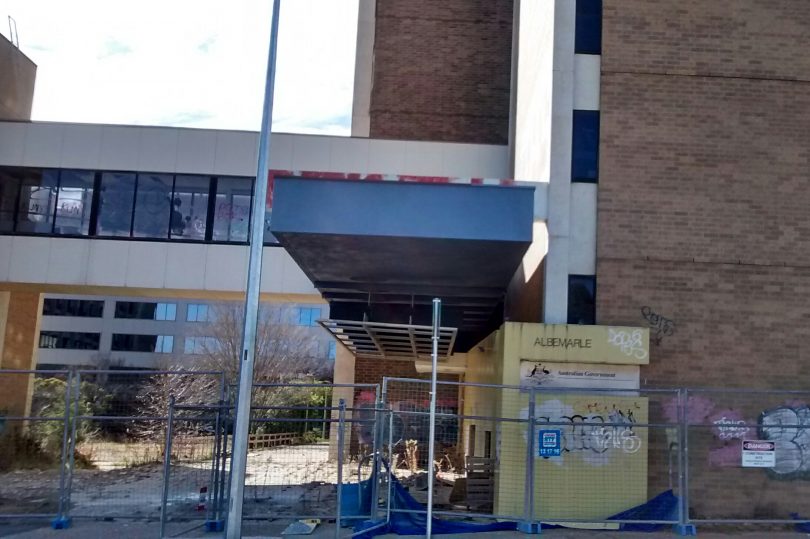
Doma’s preference is for an office building but it is looking at other options including mixed-use, high-rise residential, although Mr Edgar says that may not be the moneyspinner it sounds with so much land being rezoned for high-density housing in the area, resulting in a potential oversupply of apartments.
“The charges and costs to bring an existing building back to a vacant site have not dropped to reflect these new challenges and in fact have increased, resulting in most of Canberra’s office vacancy sitting in the worst grade buildings,” he said.
“Financiers will often be the final arbiters in these decisions and if the costs, including the Government taxes, charges and levies, are not offset enough by the revenues, the development simply cannot proceed.”
The flight of both Federal and ACT Government workers from Woden in recent years has not helped although this may be turning around with the injection of 1100 ACT public servants back into the Town Centre.
But according to Doma, any project remains in the hands of the ACT Treasury and the market.
“The development of the site could easily be accelerated should there be a requirement for a new pre-committed office requirement. Otherwise the project timing is very much a factor of market influences,” Mr Edgar said.
Woden Valley Community Council president Fiona Carrick said the site was a symbol of the neglect the area had suffered in recent years and was deterring investment in the Town Centre.
“How do we induce demand when we have that in our midst,” she said.
Ms Carrick said the Government should take responsibility and find a solution to the problem and negotiate with Doma on the lease variation charge.
“The Government and Doma should show some respect for the Woden community and demolish the buildings,” she said.
“Life is not always about commercial matters, there are social issues in a community to be considered also. Even a developer has a social responsibility to the community.”
Ms Carrick said children were entering the site and putting themselves in danger.
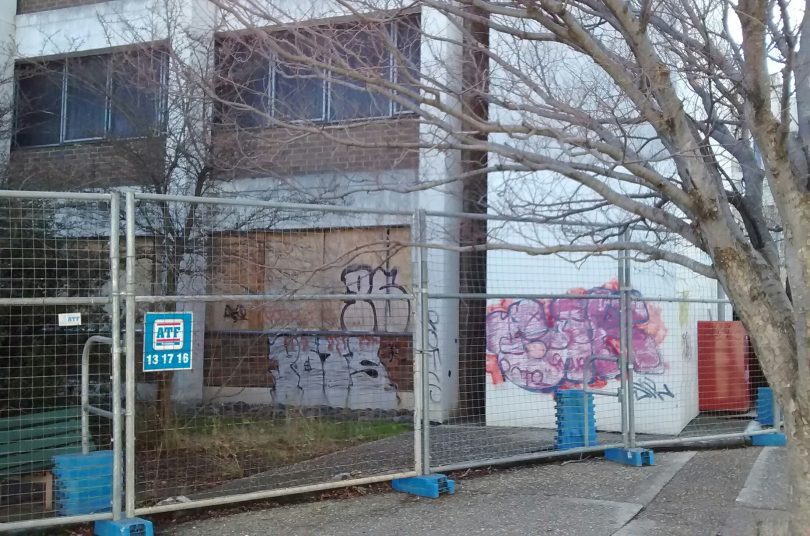
Mr Edgar said the site had been made as safe as possible with weekly fence inspections, removal of all loose items and furniture from the buildings and boarding and bricking up of openings. “There are security patrols with dogs and infrared cameras, and the police have dealt with many trespassers,” he said.
Access Canberra said it had received two concerns about the buildings this year – one on fencing and the other on the aesthetics of the site. “From a safety perspective, site security and fencing for these buildings is considered adequate at this time,” the spokesperson said.












